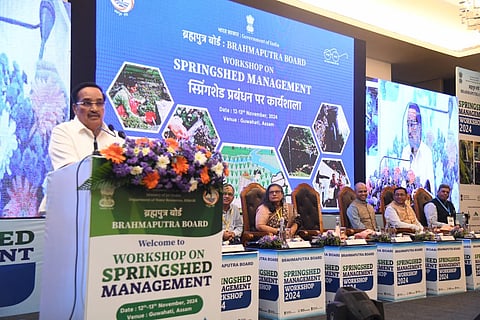
- Home
- Live Blog
- Breaking News
- Top Headlines
- Cities
- NE News
- Sentinel Media
- Sports
- Education
- Jobs

Staff Reporter
GUWAHATI: Union Minister of Jal Shaktii C.R. Paatil has emphasised the urgent need for a national commitment to water consumption.
The union minister said this while speaking at the meeting of the Brahmaputra Board’s 13th High Powered Review Board (HPRB) in Guwahati today. The Union minister inaugurated the two-day Springshed Management Workshop 2024.
The union minister said, “It is high time for all of us to focus on conserving our water sources and managing them wisely to protect them for future generations.” He noted that the Prime Minister consistently prioritised water conservation, a call that has now become the need of the hour.
The high-level meeting was attended by senior officials and ministers responsible for water resources and related sectors from Arunachal Pradesh, Meghalaya, Mizoram, Manipur, Tripura, and Nagaland, under the Ministry of Jal Shakti.
Earlier in the day, the two-day-long Spring-shed Management Workshop, organised by the Brahmaputra Board, was inaugurated by the Hon’ble Minister, which brought together stakeholders to discuss strategies for spring preservation and sustainable water resource management, underscoring the Union Government’s commitment to innovative water conservation.
The workshop aims at promoting sustainable water resource management and addresses the growing challenges faced by springs, which serve as essential drinking water sources for many communities.
Dr. Ranbir Singh, Chairman, Brahmaputra Board, underscored the vital role played by springs as lifelines for communities and noted their increasing vulnerability. He emphasised that the workshop marked a significant step toward addressing these challenges, re-energising springs, and formulating collaborative strategies for sustainable management.
Springshed management is a holistic approach to protecting and maintaining the hydrological system that sustains springs.
It involves a variety of activities, (i) including monitoring of rainfall, spring discharge, and water quality; (ii) restoring degraded land through soil and water conservation practices, such as contour bunding, check dams, and terracing; (iii) protecting recharged areas, which are often forests, through measures such as afforestation, reforestation, and preventing encroachment; and (iv) understanding social, gender, and governance aspects.
Also Read: Guwahati: City to face temporary water supply disruption for two days
Also watch: